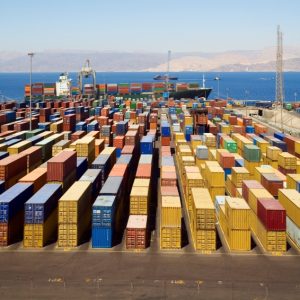Most company leaders choose to manage their own freight forwarding. If you import a few times a year, it’s still best to control the transportation from the origin port or airport using FOB (Free on Board) terms of sale.
We’re here to support you by providing the following basic information outlining U.S. import duty and taxes and how they are assessed. For information on the current tariff rate increase and its impact visit our webpage on this topic.
After you review this information, call us with questions. Our tenured and trusted team is here to support your freight forwarding needs, 800-645-0386.
 Overview
Overview
Import duty and taxes are owed when importing goods into the United States, whether by a private individual or a commercial entity. The valuation method is FOB, which means that the import duty and taxes payable are calculated exclusively on the value of the imported goods. However, some duties are based part in value and part in quantity. In addition to duty, imports may be subject to a Merchandise Processing Fee, Harbor Maintenance Fee and in some cases to sales tax, and Federal Excise Tax.
The Customs Territory of the United States includes all 50 states, the District of Columbia, and Puerto Rico. Therefore, Puerto Rico applies the same tariff codes and rates as the United States, but it has its own fiscal jurisdiction.
Duty Rates
Duty rates in the United States can be ad valorem (as a percentage of value) or specific (dollars/cents per unit). Duty rates vary from 0 to 37.5 percent, with a typical duty rate about 5.63 percent. Some goods are not subject to duty (e.g. some electronic products, or original paintings and antiques over 100 years old).
Preferential duty rates
The United States has signed Free Trade Agreements (FTAs) with a number of countries. To be entitled to this preferential tariff treatment, a good must meet the “originating” criteria as set out on the Rules of Origin of individual FTAs. A Certificate of Origin (COO) is required upon importation for preferential duty rates to apply. See a sample COO for NAFTA here.
FTAs signed by the United States apply in the U.S. Customs Territory, which includes Puerto Rico.
Sales Tax
Sales tax is not automatically charged on imported goods. However, Customs and Border Protection (CBP) declarations are made available to state tax representatives that may occasionally claim state taxes from the importer.
Minimum thresholds
Duty is not charged if the value of the imported goods is up to $800.
Other taxes and custom fees
CBP collects federal taxes and fees on behalf of other federal agencies, such as the Internal Revenue Service, depending on the commodity being imported. User fees depend on the type of entry and mode of transportation.
- Federal Excise tax is imposed on imports of alcoholic beverages and tobacco.
- Merchandise Processing Fee (MPF) is charged on formal and informal entries:
– MPF on informal entries is either $2.10 per shipment, Mail fee $5.77, manual entry $3.15.
– MPF on formal entries (for imports of goods valued over $2,500) is set at 0.3464 percent of the value of the goods with a minimum charge of $26.22 and a maximum of $508.70.
Duty refunds
In case of overpayment of duty or returns of imported products to the seller, the importer might be entitled to a duty refund. The relevant information and requirements can be found here.
Local Customs office and contacts
More information on import declaration procedures and import restrictions can be found at U.S. Customs and Border Protection.
